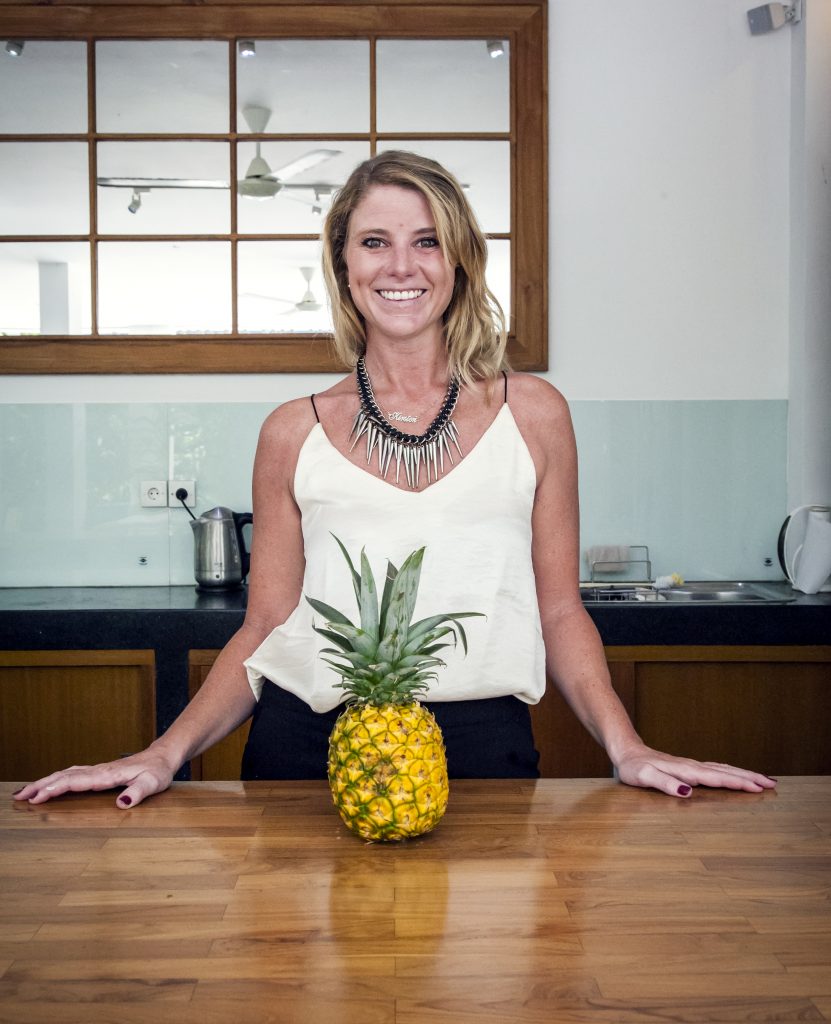A Naturopath’s Guide to SIBO
Guts & Girl Bits – Episode 45 with Kirsten Greene
I’m so excited to share this episode with you all because SIBO is a condition I have been seeing a lot in clinic, and so I am thrilled to share this deep dive into SIBO with you.
Kirsten Greene (previously Swales) is a Naturopath who loves working with all this digestion, especially SIBO. She shares helpful tips of how to work through SIBO and also her own journey with this condition.
SIBO, also known as Small Intestinal Bacterial Overgrowth is a condition that can contribute to a wide variety of symptoms, but some of the classic signs that this may be something to consider include:
- Bloating, especially soon after eating
- Diarrhoea, or Constipation
- Wind (Farting, Burping)
- Stomach pain
- Food sensitivities – especially the fodmap group
- other inflammatory conditions that you can’t pinpoint the cause

In this episode Kirsten shares information about:
- What is SIBO
- Her personal journey with SIBO
- How to test for SIBO
- How to treat SIBO, and how to target treatment based on whether you have a dominance of methane or hydrogen bacteria
- How to support digestive health while healing from SIBO
- What is hydrogen sulphide SIBO?
- Other forms of microbial imbalance: LIBO, and SIFO
- Strep infections and SIBO, and how your dental health can impact SIBO
- Biofilms and SIBO
- What are some common mistakes that people make when trying to treat themselves from SIBO?
The Podcast
Have a listen here or on the embedded player below:
Get in touch with Kirsten
Kirsten Greene (previously Swales) has been a practicing Naturopath, Nutritionist and Western Medical Herbalist for the past seven years, and specialises in working with clients who have SIBO (Small Intestinal Bacterial Overgrowth).

Originally from South Africa, trained and qualified in Australia, Kirsten is a practicing member of Naturopaths and Herbalists Association of Australia and now calls Bali, Indonesia home.
Kirsten has worked in Australia, South Africa and Europe and consults with clients worldwide online.
Originally from South Africa, trained and qualified in Australia, Kirsten is a practising member of Naturopaths and Herbalists Association of Australia and now calls Bali, Indonesia home.
Her primary focus is helping women heal their digestive issues so they can enjoy a loving relationship with their body and food, and for some, so that they may feel “normal”, sometimes for the first time in their lives.
Having been through SIBO and suffering digestion issues herself for years, Kirsten is super passionate in this area and can relate to what her clients are going through.
SIBO free to this day, Kirsten has gone from living with an extreme fear of food due to bloating, weight gain and discomfort, to having a healthy, functioning digestive system and sound relationship with all food.
This is what she wants this for all other SIBO sufferers too.
Connect with Kirsten:
www.kirstenswales.com/
Instagram: www.instagram.com/kirsten.greene.nd/
Facebook: www.facebook.com/kirstenswalesnaturopath/
Youtube: www.youtube.com/channel/UCjgjfDxqujHARmLtuf3Dpug
Kirsten’s Online Course: www.kirstenswales.com/online-course/
Podcast Transcript
Alison Mitchell 0:08
Hi everyone, you’re listening to Guts and Girl Bits. I’m Alison Mitchell, a practicing Naturopath. I hope to share with you all sorts of information about women’s health and digestive health to educate and empower you to make informed choices about your own health. Please remember that all information is general and does not replace consulting with the practitioner.
Hi, everyone. Welcome to guts and girl bits. Today, I’ll be talking with a fellow naturopath. All About SIBO! SIBO, also known as small intestinal bacterial overgrowth is something that is affecting so many people and causing all sorts of tummy troubles. So I love working with people with digestive stuff, hence the name of this podcast, guts and girl bits and I’m really excited to share this information because Something that I’ve been talking about to a lot of my patients about SIBO and finding there’s heaps of people out there that are like ‘What? What is SIBO?’
So this podcast is awesome because my guest is extremely, extremely knowledgeable about SIBO. She has been through the process of healing herself, of SIBO and has helped countless people in their own journeys with the SIBO as well. We talk about what is SIBO? How does it come about? What are some of the testing options? What can we do to treat it, including different options with medicines from doctors like certain anti biotics as well as different herbal options, and we talk about, you know, do we use probiotics? And if you do, what sort do we use? We talked about the different diet options because there’s so much information out there. And what are the common mistakes that people make when trying to treat themselves for SIBO? And how long should we wait expect to get better.
So my guest is the amazing Kirsten Swales (Greene). She has been a practicing naturopath, nutritionist and Western medical herbalist for the past seven years. And she specializes in working with clients who have SIBO. She’s worked in Australia in South Africa and Europe and she consults with clients worldwide online. She’s originally from South Africa, but she’s trained and qualified here in Australia. And she now calls Bali Indonesia home. So her primary focus is helping women to heal their digestive issues so that they can enjoy a loving relationship with their body and food emphasizes that they might feel normal sometimes for the first time in their lives. Having been through SIBO and suffering digestion issues herself for years because it’s super passionate in this area, and can relate to what her clients are going through. Having been SIBO free to this day. Kirsten has gone from living with an extreme fee of food due to bloating rates. pain and discomfort to having a healthy functioning digestive system and a sound relationship with food. And that is what she wants for all other SIBO sufferers to have as well. Kirsten is so generous with her knowledge. And she has shared so much amazing content in this podcast. I was like wow Kirsten you are giving gold. So I’m really excited for you to listen to anyone that has been diagnosed with SIBO or suspects that they have SIBO or even if they just have some health issues that they haven’t quite been able to get to the bottom of have a listen to this episode because as we talked about SIBO is linked to so many other things in the body and it’s actually not a forever Doom diagnosis you can get better. So thank you for listening. I hope you enjoy!
Hi, Kirsten, thank you so much for joining me today.
Kirsten Greene 4:03
Thanks, Alison. Thanks for having me.
Alison Mitchell 4:06
Yay. So I’m so excited to have you here to talk about all things SIBO, because this is just a topic that I’m seeing so much more of, I think is becoming so much more common as well. And many people don’t know much about it, but it’s one of those hidden issues, isn’t it? Like, you know, if in doubt, look for SIBO in terms of gut health do you think that’s right?
Kirsten Greene 4:32
Definitely. And it’s just it’s been around I’ve found references in the studies from like the 1800s. But only recently has it been getting that awareness and it’s so so so common, and it’s something that is fixable, so I get really excited about it.
Alison Mitchell 4:47
Yeah, I love that you start with that it’s fixable because it is isn’t there then so many people like ‘oh no have I got this forever?
Kirsten Greene 4:56
Yeah, where sometimes people get tell they just have IBS, and it’s given what’s causing your IBS, and then this is something that causes it and you can get to the bottom. Mm
Alison Mitchell 5:05
hmm. You know, that’s so common, isn’t it? IBS? Oh, I’ve got IBS. That’s the answer. So I have to eat this particular diet or take this drug for the rest of my life. And it’s like, no. Oh, you don’t? So I’m really fascinated to know, how did you get into this career path?
Kirsten Greene 5:28
So I think like most naturopaths it comes from a desire to fix ourselves. I had issues most of my life, and I got a bit of a joke that I probably popped out the womb on a digestive back foot. my mom said I was a very colicky baby. And then I was always just aware that digestion was not so much digestion. I was always just aware that food was a bit of an issue for me. So I was often hungrier than I seemed. compared to most of my friends. I struggled with gaining weight really quickly, except now that I know that I want to know It wasn’t that I was getting fat, I was just getting bloated. So I just came to believe that it was normal that every time I put food into my stomach that it would puff out. That’s actually not normal. That’s not meant to happen. So i was constantly trying all these different things to just feel better than I did for any new diet that came along. I would try to eat one thing diet, I would try eat cabbage diet, I would try the Atkins diet just so I could feel better. And I maybe did feel better in the moment, but it would always just rebound. And I often feel a bit worse than when I first started. So that was always a thing for me. And when I travel quite a lot in my early 20s and then run by the age of 24. I decided I was going to study something and it just happened to be a trade remedial massage because I like people I like working with people and this was an area that fascinated me. So it always been into natural stuff and how this can help us without hurting ourselves and then didn’t even know what a naturopath was but the college that I was studying at in Australia had a naturopathy course, a nutrition course, had a homeopathy course. And then we go home and with my friend, we had that prospectus in our hand, and we were googling these names meant because we didn’t even know. But just before the course started, there was a lecturer giving a talk on introduction to naturopathy and I thought. Oh, my goodness, this is it. So walked out of that room into the registers to my course and haven’t looked back since. So I’m so so grateful for all the issues that I’ve had myself, even though they were so horrible, but it led me to where I am. And if I had to do it all over again, I totally would, I’m so grateful.
Alison Mitchell 7:37
Yeah, I guess that has given you that real empathy that so many people really need from their carer as well. Mm hmm.
Kirsten Greene 7:45
Yeah. I can totally understand because I probably had all the symptoms that they’ve had themselves. Yeah.
Alison Mitchell 7:53
Hence the passion for digestion. Right. So is that what people mostly come to see for for digestion, Or are people coming to see you for other things as well?
Kirsten Greene 8:04
Definitely digestion. And so now I focus. I specialize in SIBO specifically. So I myself had SIBO back in 2016. And since then that’s really, really been my focus. So I know inside out and I get so much joy from helping other people with it. So they come to me with SIBO. Sometimes it turns out that it’s not SIBO, even if they’ve been told that it’s SIBO. So, I don’t specifically exclude anybody else that doesn’t have SIBO so all digestive stuff I help with. So often the method of healing up the digestive system is the same the specifics in terms of treatment might be different. But there’s so many different guidelines that apply with all digestive health. So it could be “just IBS” or it could be crohns, or it could be coeliac or it could be food intolerances. So all these things are my favorite topics. And when people come to me for.
Alison Mitchell 8:53
yeah, okay. And SIBO in particular is something that as we were talking about, you know, it’s becoming more more well known people are getting more awareness around it. But it’s been around for a long, long time. But So how long have you been treating that specifically? Has that been something that you know, you’ve just jumped you started your practice really passionate about it? Or was there a moment where it’s like, oh, this is the thing.
Kirsten Greene 9:19
I kind of evolved from my own journey. So when I graduated as a naturopath I knew that I wanted to specialize in digestive health because that had been my journey. And then when I got see by myself four years ago, then it became my sole practice because I know it. I know it so well, because I’d been through it myself and I’ve all the hundreds of you are treated since then. I’ve just know it so well and what to look out for how to get better in the quickest and most enjoyable way because it doesn’t have to be awful SIBO treatment doesn’t have to be awful. You just need to know what you’re doing. And I really enjoy that the past four years and then just have health for the past almost decade, I guess. Yeah.
Alison Mitchell 9:56
Now I think there might be some people listening that don’t actually know what SIBO is. So can we just, you know, backtrack a little bit and say what actually is a SIBO?
Kirsten Greene 10:09
Sure thing so it’s S I B O, and that’s acronym for small intestinal bacterial overgrowth. So it doesn’t necessarily mean that there’s bad bacteria in your digestive system, it just means that it’s in the wrong spot. So ideally, we want this one to find to be relatively sterile in terms of bacteria. And then we want most of our bacteria to be in the large intestine. And there’s different kinds of SIBO as well. So there’s two main ones and then there’s a third one that’s getting more attention recently. So you have your methane dominant SIBO, where your methane gasses at highest produced by the methanogens, and then you get your hydrogen dominance SIBO, and then the third one that’s come out recently, more more focus on recently is the hydrogen sulfide to see by three different kinds there.
Alison Mitchell 10:56
Ah, and the hydrogen sulfide one is not somthing thing that I’ve heard or is that something that you can pick up, particularly with the testing, which we’ll talk more about the testing later.
Kirsten Greene 11:07
So there’s no specific test just yet that you can get Park Pimental from Cedar Sinai is working on it. But so it’s more of a process of elimination from the other tests, and then also taking a really good case history, and then they can find out more about this. There’s certain kinds of bacteria that released the sulphate gas, like Desulfovibrionales and Bilophilia wadsworthia they are the most common ones, but it’s that stinky guess is that rotten egg smelling gas may produce that.
Alison Mitchell 11:34
Interesting. So, let’s talk about some of the symptoms of SIBO what are some things that people should be looking out for that might go ‘hmm Maybe that’s related to me.’
Kirsten Greene 11:47
There’s so many, so the most common one for sure is the bloating especially and the timing of the bloating is important as well. So if it’s one to three hours after eating, then you can suspect at this moment of time, if it’s actually to three hours, then you might think of the large intestine. So definitely, definitely, definitely the most common symptom, but you don’t have to have bloating to have super. I’ve had clients before that, no issues with bloating but still have SIBO. Then also there are issues with your number twos. So it could either be diarrhea, it could be constipation, or could be an alternating of the two. Then you also get your food intolerances. So lactose intolerance is definitely a common one. And then also an issue with foods like the fodmaps, which are your fermentable carbohydrates and certain foods, and even garlic would be a biggest triggers for sure. There’s often an issue with digesting and breaking down the fibers in the foods and then the fiber is the indigestible part of a plant food so in your carbohydrates, so that’ll be the biggest one in there. But then you can also experience pain, gas. cramping, brain fog is really really common, joint pain, stiffness, skin issues, so many things associated with SIBO.
Alison Mitchell 13:01
Okay. So sometimes it could be something that you wouldn’t even think is related to your digestive system, but then turns out it actually is.
Kirsten Greene 13:13
I know, it’s all so connected.
Alison Mitchell 13:16
Yeah, the gut’s just connected to so many things. Okay. So why are people actually getting SIBO in the first place?
Kirsten Greene 13:28
Someone asked me on my Instagram a little while ago what I think the common cause of SIBO is, and I say stress. And that could be physical stress. It could be mental stress, or it could be emotional stress. So SIBO is a condition and SIBO is an underlying cause of things like IBS, but then what went wrong to allow SIBO to get there in the first place? Because our bodies are so amazing. It’s an amazing organism. It is so well adapted at keeping everything in check and functioning by itself. But for SIBO to have got there, there’s got to been a breakdown in a protective mechanism somewhere along the way that allowed it to get there. A really common cause is food poisoning. So a lot of people can pinpointed on that holiday to Mexico where they had a funny mohito. And now they’ve got digestive issues. So food poisoning can do things with a digestive system and then somehow the bacteria is allowed to migrate up into this momentous time. And once it’s in this momentous sign, you have to take steps to get it out. So that could be we’ll come to this later, I’m sure but the antimicrobials or pharmaceuticals or the elemental diet. So that’s a physical stress that can cause the SIBO but really underestimated is the emotional stress as well. So if we are constantly under pressure, and no one likes to think that they stress they really don’t, but if you could take a little minute and just look at yourself and how you respond to the stressors in your life. So say you say someone scratched your car and he didn’t even really care that might be pretty low on the scale. Say you went to the shop to buy an avocado and they were out of stock and he burst into tears, it would probably that your stress response is a bit on high alert And if you’re having panic attacks, and you might get a 10 out of 10. And I just wanted to bring that up is because when we’re in the stress mode, we tend to be in what we call our sympathetic nervous system, which is also called our fight and flight. And then when we’re in our sympathetic nervous system, our parasympathetic nervous system, which is our rest and digest gets shut down. So what that means is that sometimes our stomach acid doesn’t get produced at the right amount, or our stomach is constantly contracted like this, if you get a fright, you can notice that you gasps and your stomach will be contracted. So the peristalsis couldn’t happen. So things don’t move through as effectively. So that would be really common. But in terms of the physical thing for sure, there’s food poisoning, and then a history of antibiotic use. It could be back from when you were two years old, unfortunately, and things like this probably out of your control. So it’s always lovely to find your underlying Cause for getting SIBO in the first place. But also knowing that sometimes there might not be one specific thing. So for myself, I probably can’t relate it to one specific thing, more like a accumulation of things going wrong from birth, pretty much. So then it’s looking after your whole digestive system to get everything. And there’s protective mechanisms back in place, and then you can keep it away.
Alison Mitchell 16:26
Beautiful, thank you. I think that’s really interesting. linking it to that sort of relative stresses of that and how some people would say, I don’t have that much stress, everything’s right, but it really comes down to how they feel about it, how they react.
Kirsten Greene 16:42
yeah, if you’re waking up at 3am definite sign that your adrenals are a little bit fried. So I would you know, glands help us with our stress hormones, so adrenalin and cortisol, which is really important because if someone is pointing a gun at you, you need to make it so the cortisol will help us make those really quick decisions about which way to go. What do we do? So we need this one. But when it goes into prolonged stress, that’s when it becomes a problem. If you ever seen a zebra getting chased by a lion in the wild, while they’re getting chased, they in full on sympathetic nervous system fight or flight. But if they managed to get away from a lion and see the lion eating a difference zebra, they switch back very easily into their parasympathetic so they get back into the rest and digest. So you’ll see them eating grass happily and no problem. And then the biggest stressors, they say, studies have even backed this up. The biggest stressors that we have these days is deadlines, the deadlines at work, and bills that we receive a bill and then also even low batteries on our smartphones. So we know… laughs it’s so funny. So we intellectually know that these things won’t kill us. But our body will go into the same protective mechanisms as if it would. So it goes into your sympathetic nervous system, so digestion shuts down. Huge Cause.
Alison Mitchell 17:58
you know, I mean, for me I’ve got a really good life and things stress me out. And it’s the stupidest things. It’s things like my son way to put his socks on in time. You know, they’re such little things and yet maybe my adrenal glands need a bit of nourishing, who knows. But it’s all relative, it’s how you feel about the situation.
Kirsten Greene 18:24
And then also in our digestive system, we’ve got the enteric nervous system. So enteric relates to your intestines, and there are more nerve endings in your enteric nervous system than they are in the spinal cord. So if you’ve got digestive issues, and you’re constantly being triggered by an enteric, nervous system, say with food intolerances, that’s going to over stimulate the rest of your nervous system as well.
Alison Mitchell 18:46
For sure, so I think that people don’t often think about that do they but I’m so glad you’re talking about it because you’ve got to work on the gut to treat the nervous system, and you’ve got to treat the nervous system to treat the gut.
Kirsten Greene 18:59
No and it’s so wonderful when it all comes back into balance and it’s kind of I see my clients go through the process and then when I’m doing my last consult with them and then when they’re better we go through the intake form and compare with how far they’ve come and they often it’s so wonderful to see that they forget how stressed they used to be or they forget how scared of who they used to be. And that’s when you know that… God love it. I love it. I love it so much.
Alison Mitchell 19:25
That would be so nice, for both of you I would imagine. So that’s so that’s really interesting. So the SIBO has this massive connection with our mental health because of enteric nervous system and we’ve got all these neurotransmitters being made in gut like our serotonin and dopamine and our GABA, they’re all needing a health gut. We need that for our healthy neurotransmitters. But what about other sorts of conditions? Are there other sorts of health conditions or other seemingly unrelated symptoms that we can link to SIBO?
Kirsten Greene 20:04
I could probably tie almost every condition back to the gut. The main ones I’d say, because SIBO can lead to a lot of inflammation in the guts. And so SIBO can mess around with our digestion and absorption. So if you imagine that you are making food in the kitchen, and you just leave it lying around, so if you leave it laying around long enough, you’ll start to get the ants, leave it lying around even longer, and then you’ll start to get the mice and then you’ll start to get a whole bunch of stuff. So it gets a really big, festy mess. So that’s happening in your digestive tract. Just imagine the kind of bacteria that you are attracting and the pathogens that you are attracting, and it crowds out good stuff, which usually controls them. So then that can lead to a lot of inflammation in the digestive system. And then inflammation in that digestive system, if it goes on too long, can lead to inflammation, body wide. So most conditions have to do with inflammation. So almost anything that ends in ‘-ITIS’ so like arthritis, dermatitis, the itis relates to even hepatitis relates to inflammation of – all those conditions for sure. Then acne is a big one. I used to have horrendous skin, it was so bad. And then back when I was in college, it was okay. And then learning what we know, I came off the contraceptive pill, my skin just exploded. And then I was managing it a little bit with different herbs. And then I went vegetarian for a period of six months, because it was heralded as the most healthy diet. It’s like, Okay, this is gonna make me feel amazing. I’m going for it. So I went full vegetarian for six months. But I felt so so so awful, because at that stage, I didn’t have the digestive system strong enough to handle it. Whereas nowadays, my diet is mostly vegetarian, because I’ve spent so much time working on it and I can actually digest the food that I’m eating.
Alison Mitchell 21:52
A lot of plant fibres there.
Kirsten Greene 21:53
I know, and it’s so good for us. We just need to make sure that we can digest them and break them down. I had really, really bad acne when I was going through the vegetarian stuff. Now I don’t. So now that I healed my gut that’s gone away. Definitely joint pain for sure. And then also anxiety and depression often are connected to the digestive system as well. Not saying always, but definitely a lot of the time. If there is a group of bacteria called the gram negative bacteria, and these are the not so good bacteria, and then when our digestive system is out of balance, they can override a lot of good bacteria. Just I love to compare it like a garden it’s so similar to a garden. So if you have this garden, the grass and the plants and all the things and if the weeds start to take over, and they knock that balance, then they can just grow and grow and grow and more and more and more our good plants would kind of suffer there’s no space for them. So these Gram negative bacteria, they, in their shells, they have something called lipo- polysaccharides. So lipopolysaccharides are classed as an in endotoxin: endo means within and a toxin is a toxin. So these lipopolysaccharides are so inflammatory. And then if there’s a case of leaky gut, which is when the tight junctions of the gut separate and things can get into the bloodstream, they aren’t meant to. So if these lipopolysaccharides get into the bloodstream, and then just like the gut barrier, we have a blood brain barrier, which can also end up leaky, so leaky brain some people call it, and then if that gets into the brain, it can inflame the brain and cause feelings of depression. And this is even how they test the pharmaceutical antidepressants. Like they inject the poor mice with lipopolysaccharides and then test their pharmaceutical antidepressant to see if it’s effective. So that’s hugely connected.
Alison Mitchell 22:41
That doesn’t get spoken about much does it?
Kirsten Greene 23:43
Noo, and people don’t realize and they think that it’s a nervous system condition, when actually it’s coming from the gut. And if you can fix your gut, you don’t need to be on antidepressants you don’t need to be on even if it’s herbal Nervous System support, if it’s coming from your digestive system. There’s a lady called Dr. Allison Siebecker. She’s probably one of the pioneers in terms of theSIBO world. I love her. And she’s got a website called siboinfo.com, and she’s got a whole page dedicated to associated conditions. Also, because she’s a research scientist, she’s got the research studies backing up all the different things. If you wanted to see more, what’s involved in you can go to siboinfo.com. I forget the exact page, but it’ll be there somewhere.
Alison Mitchell 24:25
I’ll pop the link for that in the show notes. (Here it is: https://www.siboinfo.com/associated-diseases.html).
…more transcript to come!










